June 1, 2025 | 07:30 GMT +7
June 1, 2025 | 07:30 GMT +7
Hotline: 0913.378.918
June 1, 2025 | 07:30 GMT +7
Hotline: 0913.378.918
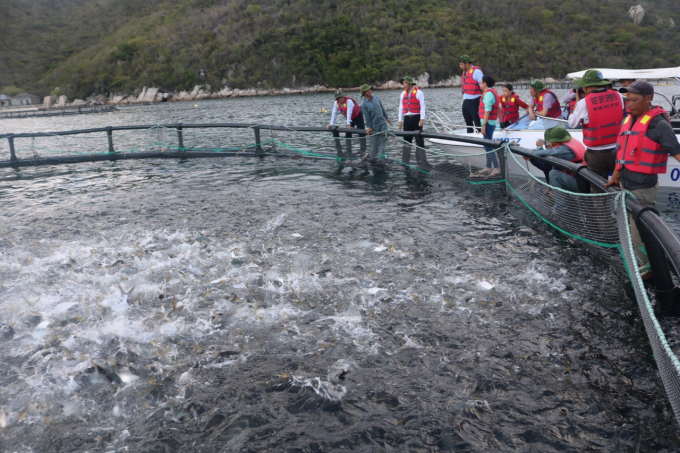
Khanh Hoa has many advantages for marine farming but has yet to fully exploit its potential. Photo: KS.
Khanh Hoa province has many advantages in marine farming development with a coastal length of 385km, 200 islands of varying sizes, many lagoons and bays such as Van Phong bay, Cam Ranh bay, Nha Trang bay, Nha Phu lagoon.
This is also a locality with many marine training and research institutions such as Nha Trang University, Nha Trang Institute of Oceanography, Aquaculture Research Institute III, etc. with quite developed technology transfer, having actively produced many new varieties, completed many advanced farming processes for high productivity, favorable for aquaculture development.
Additionally, Khanh Hoa is one of the major seed production localities in the central region. The varities of aquatic products produced is diverse, including many special seafood species with high economic value such as: black tiger shrimp and white leg shrimp, snails, sea fish, geoducks, crabs, sea cucumbers...
Khanh Hoa's aquatic seed source not only supplies the local needs but also exports to western and northern provinces such as Ca Mau, Ben Tre, Long An, Ho Chi Minh City, Binh Thuan, Nghe An, Hai Phong, Quang Ninh…
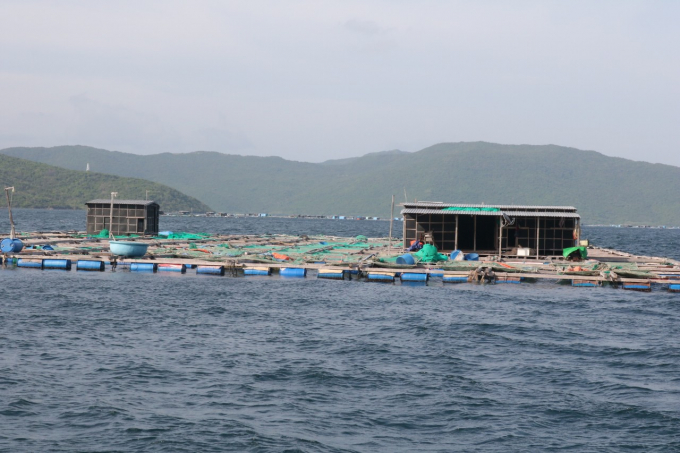
Currently, farmers utilizing wooden cages are vulnerable to heavy damages when storms make landfall. Photo: KS.
However, Mr. Nguyen Tan Tuan, Chairman of Khanh Hoa Provincial People's Committee, acknowledged that the current cage farming areas are mainly near the shore and along the island in the lagoons and bays. Marine farmers in the province mainly follow the traditional process, on a small scale, most cages are made of wooden materials, which cannot withstand big waves.
The traditional cage farming of fishermen is not yet adapted to climate change. Some subjects do not have a standard farming process or have not yet been studied and tested, most fishermen use fresh food, the density of rearing in the farming areas is not controlled, leading to a polluted farming environment; Science and technology in seed production is still limited, not fully active in artificially produced breeds, and produced breeds have not yet met the demand for commercial farming.
Marine farming requires large investment capital and extended farming time, but the participation of large business is still marginal; Meanwhile, workers involved in marine farming lack knowledge of science, technology and have limited awareness of preserving and protecting the environment in the farming area.
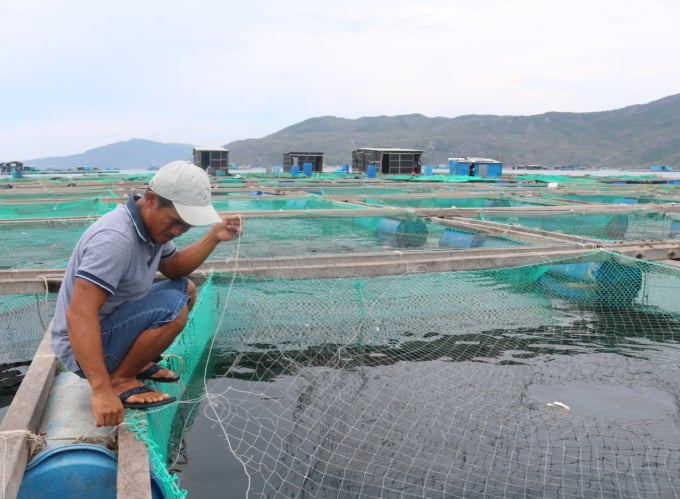
The province will develop a policy to support farmers in converting from wooden to HDPE cages to adapt to climate change. Photo: LK.
To solve these shortcomings and limitations, Khanh Hoa Provincial People's Committee Chairman, said that in the immediate future, the province will issue a document to identify aquaculture areas in the province to have a unified basis on inventory and rearrange the number of cages in bays, lagoons.
After which, the province considers promulgating local technical regulations on materials used to make floats for aquaculture cages at sea in the province in order to convert from traditional cages to cages made from suitable materials.
In addition, Khanh Hoa province has assigned the Department of Agriculture and Rural Development to develop a policy and roadmap to support fishermen in converting cages using traditional materials to cages using new HDPE materials that are resistant to wind and waves, adaptive to climate change, ensuring safe conditions for farmed aquatic products as well as protecting the ecological environment.
In addition, in the Plan No. 10823/KH-UBND dated October 28, 2021 by the Provincial People's Committee on the Strategy for Vietnam's Fisheries Development towards 2030, with a vision to 2045 in the province, the province detailed the following tasks: solutions to support vocational training, high-quality human resources training for management, research and production for marine farming.
Regarding this plan, the head of Khanh Hoa Provincial People's Committee, added that for coastal areas, Khanh Hoa province will deliver sea water to people according to Article 44 under the 2017 Fisheries Law so that aquaculture farmers can invest in production and stable life assuredly.
Along with that, propagandize instructions on converting from traditional wooden cages to cages made of new materials (HDPE) that can withstand strong waves and ensure safety, beauty combined with the model of marine tourism. At the same time, raise new varieties of economic value, key products, combining multi-species farming to increase efficiency and reduce environmental pollution.
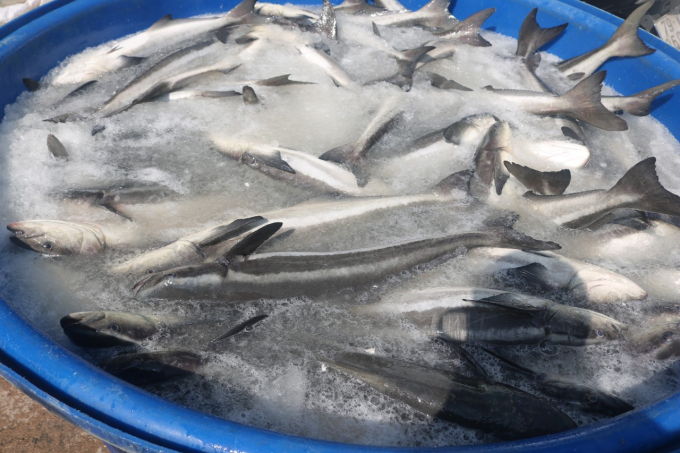
Harvesting cobia in Van Phong Bay, Khanh Hoa province. Photo: LK.
For open sea areas, the province will call for experienced businesses with potential to invest in industrial farming with modern cages to further increase the output of industrial farming; while promoting research and application of science and technology in commercial farming.
Along with that, Khanh Hoa province will also orient the province's main aquaculture production to quickly switch to production of seafood as commodities, improve the value of aquatic species per unit area and origin tracing, ensuring raw materials for the processing and export industry.
Invest in constructing infrastructure for concentrated aquaculture zones; develop aquaculture areas in the direction of farms, industry, associated with processing. Apply science and technology to aquaculture, ensuring disease safety and improving economic efficiency. Research and evaluate the use of feed in aquatic cages in present days.
Additionally, form aquaculture association groups, leading to establishing cooperatives in aquaculture and link with businesses consuming products to stabilize income for farmers.
With the orientation of marine farming in Khanh Hoa, the Chairman of Khanh Hoa Provincial People's Committee said that the area of inshore cage farming will gradually be reduced, replaced by the development high-tech open sea farming.
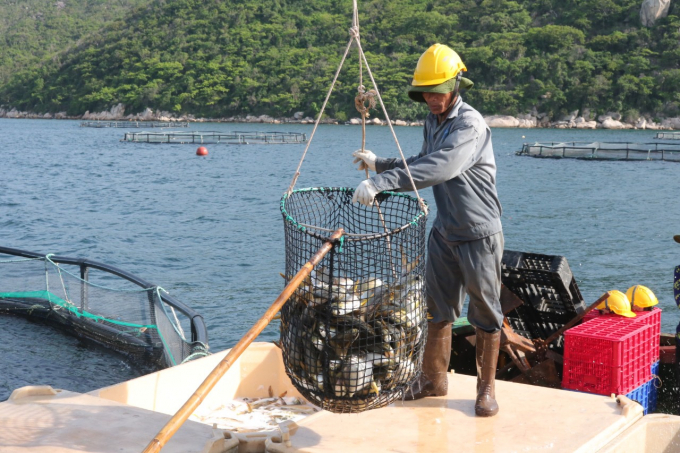
Khanh Hoa province will gradually reduce the area of coastal cage farming and develop high-tech open sea farming. Photo: KS.
In addition to developing policies to support fishermen in converting cages using traditional materials to cages using HDPE as mentioned above, the province will also offer a number of solutions to develop marine farming on an industrial scale.
Specifically, the province will conduct a survey of the province's open seas to identify potential locations for marine farming development, based on which, study and implement a number of advanced pilot marine farming models in the open seas as basis for replication of industrial marine farming in association with environmental protection.
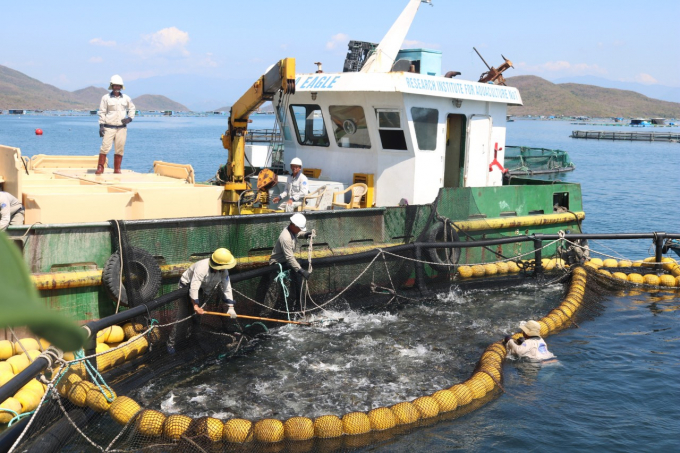
The province will facilitate to attract businesses to invest in marine farming on an industrial scale. Photo: KS.
At the same time, create favorable conditions to attract businesses inside and outside the province to invest in manufacturing industrial marine farming equipment and means (HDPE cages, buoys, nets made of new materials, environmental automatic monitoring equipment, smart feeding system…).
Khanh Hoa province also promotes to attract large-scale seed export businesses, industrial feed production, logistics and service organizations for industrial marine farming in a sustainable way.
Along with that, build a mechanism to link marine farming with other economic sectors for mutual development. Organize offshore aquaculture production in combination with national defense and security, ensuring marine economic development in association with the protection of sovereignty over the seas and islands.
Mr. Nguyen Tan Tuan, Chairman of Khanh Hoa Provincial People's Committee, said that the province is developing a pilot project on specific mechanisms and policies for the development of Khanh Hoa province, which proposes a number of policies to develop industrial marine farming, including: Policy on allocation of marine areas and licensing of marine farming; Policy of one-time support after investment for organizations and individuals investing in marine farming.
Translated by Nguyen Hai Long

(VAN) Seafood by-products are opening a new path, combining green growth and technological innovation to enhance the industry's value.

(VAN) Mr. Nguyen Thanh Cong, Vice Chairman of the Son La Provincial People's Committee, reflects on Son La’s journey from barren hills to fruitful orchards after a decade of hard work.

(VAN) FAO’s Director-General addresses the 5th Baghdad International Water Conference.
/2025/05/26/1716-4-nongnghiep-191706.jpg)
(VAN) Chain linkages, technological innovation, and raw material zoning are three strategic pillars for the coconut industry to strongly develop and elevate its position on the global agricultural map.
![Advanced mariculture – an inevitable trend: [4] Accompanied by scientists](https://t.ex-cdn.com/nongnghiepmoitruong.vn/608w/files/sohk/2025/05/13/1941-pgsts-vo-van-nha-140958_717.jpg)
(VAN) According to Assoc. Prof. Dr. Vo Van Nha, Director of the RIA III, the development of advanced offshore mariculture is no longer an option but an essential path for Vietnam’s fisheries sector.

(VAN) Vietnam is intensifying the development of mollusk farming areas that meet international standards, aiming for sustainable growth and enhancing its export position in the global seafood market.
![Advanced mariculture – an inevitable trend: [3] Policy-driven momentum](https://t.ex-cdn.com/nongnghiepmoitruong.vn/608w/files/doanhtq/2025/05/21/0104-0616-0348-nuoi-bien-170339_789.jpg)
(VAN) To ensure the success of offshore mariculture that uses advanced technologies, it is essential to establish supportive policies that inspire both individuals and enterprises to invest with confidence.